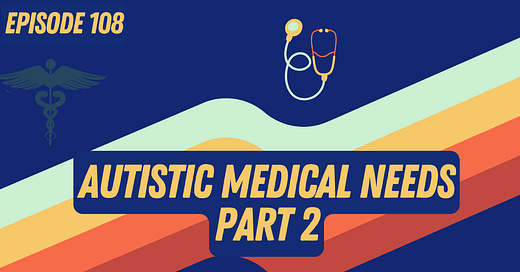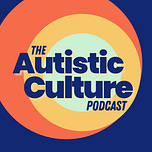An episode that checks all the vital signs.
Here’s what’s in store for today’s episode:
Today, our hosts dive into part two, a follow-up to our previous episode on autistic medical needs.
Autistic people often experience comorbid conditions, many of which stem from the distressing effects of navigating a neurotypical world. These can include POTS, MCAS, PMDD, PCOS, PTSD, and Ehlers-Danlos syndrome, among others. On the bright side, we’re at a lower risk for cancer!
Living in a world designed for neurotypicals is inherently traumatic for autistic people, often leading to chronic stress that impacts our physical health. This distress can contribute to comorbid conditions like POTS, MCAS, and Ehlers-Danlos syndrome, making medical advocacy a crucial but often exhausting necessity.
We discuss the pathological demand compliance that neurotypicals seem to exhibit, blindly following societal expectations without questioning them. This tendency contrasts with autistic people's need to understand the why behind demands, making medical self-advocacy even more challenging.
Bottom-up processing means we're constantly researching and analyzing potential medical issues, often coming to our own conclusions before seeing a doctor. However, the medical system doesn’t always operate this way, making it frustrating when our self-advocacy is dismissed or misunderstood.
Neurotypical doctors, due to the intensity and nature of their training, can carry a lot of internalized ableism. As a result, they don't always react well to autistic patients who have done their own research and come prepared with information about their condition.
We talk about the issue of medical gaslighting and how it happens frequently to autistic people, where our symptoms and concerns are dismissed or belittled by healthcare professionals.
Additionally, systemic racism remains rampant in the medical field alongside ableism, further complicating the already difficult experience for multiply marginalized autistic people seeking proper care and recognition of their needs.
Our hosts discuss the issues with medication, highlighting how it's often more hit or miss than many would like to believe, especially when it comes to finding the right treatment for autistic individuals.
We talk about how frustrating it is when you have to be assertive about your needs at the doctor’s, only to have it perceived as aggression, even though you're just advocating for your health.
There is an importance now more than ever to teach neurotypical healthcare providers how to properly interact with their neurodivergent patients, ensuring they feel heard, understood, and respected in their medical care.
We discuss the struggle of having to mask in doctor's offices and the importance of doing your own research to accompany doctor’s visits, as it’s often necessary to ensure your concerns are taken seriously.
Going to the doctor’s is a masterclass in masking—showing just the right amount of emotion and care to avoid being seen as too detached or overly emotional, all while trying to communicate your needs effectively.
Our hosts discuss how to "fake" being neurotypical by understanding the intricacies of top-down processing, where we learn to mimic expected behaviors and responses, even if they don't come naturally to us.
Having autistic connections is so important because when we find a provider who is autism-affirming or discover medical information that could help our community, we need to shout it from the rooftops to ensure everyone has access to that support.
In times like these, especially with medical situations and the ongoing DEI crisis, we need to lean on our communities more than ever for support, knowledge, and solidarity.
“We like to be in the background. We like to be in the shadows. We like to not be judged, because it’s safer there. Because otherwise, there is a chance that we will be judged, we will be left out, people will actively dislike us. But, if we are invisible, there’s no chance for that to happen.” - Matt
“Living in a neurotypical world is inherently traumatic for us. The CPTSD rate is so high for autistic people that neurotypical people can’t tell what’s CPTSD and what’s autism traits. That’s the thing about the anxiety and the depression and the gastrointestinal distress and all of this stuff. It’s not normal autistic stuff. It’s autistic distress cues.” - Matt
“The bias is that, ‘if there’s a way to fix it easily, then let’s fix it easily.’ And I don’t think that’s wrong, but it ends up feeling a whole lot like gaslighting and being pushed away when we know real things are happening.” - Angela
“But here’s the thing, because you don’t know you as well as this doctor knows you, because this doctor has a degree and went to school and they know all the things. They are God-like.” - Matt
Did you enjoy this episode? We dive into the challenges of navigating a neurotypical world with a neurodivergent brain, exploring the medical hurdles and advocacy we face. From medical gaslighting to the struggles of masking in doctor’s offices, we discuss how these issues impact our health and well-being. Let us know your thoughts in the comments, and use #AutisticCultureCatch to share your experiences and connect with others on social media!
Related Episodes:
Follow us on Instagram
Find us on Apple Podcasts and Spotify
Learn more about Angela at AngelaKingdon.com
Our Autism-affirming merch shop















Share this post